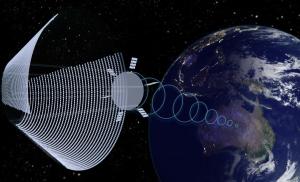The National Space Society Supports New UK Government Space Solar Power Initiative
Space Solar Power is Safe, Affordable, and Will Help to Save the Environment
Two power station designs were concluded to be technically and economically viable in the report— the hyper-modular SPS Alpha design by NSS Board member John Mankins and the SSP CASSIOPeiA design by Ian Cash of the UK.
While SSP has been deemed technically viable for decades, recent projected reductions in cost make it appear to be inevitable. Notably, the expense of launching items into space has dropped by a factor of 14 times since the space shuttle era, and is expected to drop further when SpaceX’s Starship becomes operational. The cost of constructing space solar power satellites will also drop when the modules are built in volume. The new hyper-modular SSP designs take advantage of this, and the UK study calculates the projected cost using this approach to SSP to be competitive with other energy technologies.
Randy Gigante, the NSS’s Policy Committee Chair, supports the phased approach outlined in the study. This includes a 500-megawatt demonstrator in orbit by 2032, and the connection of two gigawatts of SSP to the power grid by 2040. “The Frazer-Nash report suggests that, with an appropriate near-term R&D effort, the cost barrier for SSP can be broken,” Gigante said. “This can have a positive effect on climate change in general and net-zero emissions in particular.” To maintain this schedule, the public sector would need to fund about 473 million dollars (350 million pounds) over the next five years to complete Phase 1 of the program.
The UK Government has already established a one-billion-pound fund to accelerate the commercialization of low-carbon technologies, and proposals are being sought for dual-use technology development that could assist both space-based and Earth-based power systems. The current deadline for submission of ideas is November 1 and can be submitted here
More information will be forthcoming as part of the United Nations COP26 Climate Change conference in November 2021 in Glasgow, Scotland.
See the NSS website for more information on space solar power.
The National Space Society was founded in 1987 via a merger of the National Space Institute, founded to promote citizen support for the American space program, and the L5 Society, based on the work of space settlement pioneer Gerard K. O’Neill. The NSS is the preeminent citizen's voice on space exploration, development, and settlement. For more information go to space.nss.org.
Randy Gigante
National Space Society
+1 240-409-8961
email us here
Visit us on social media:
Facebook
Twitter
Legal Disclaimer:
EIN Presswire provides this news content "as is" without warranty of any kind. We do not accept any responsibility or liability for the accuracy, content, images, videos, licenses, completeness, legality, or reliability of the information contained in this article. If you have any complaints or copyright issues related to this article, kindly contact the author above.

